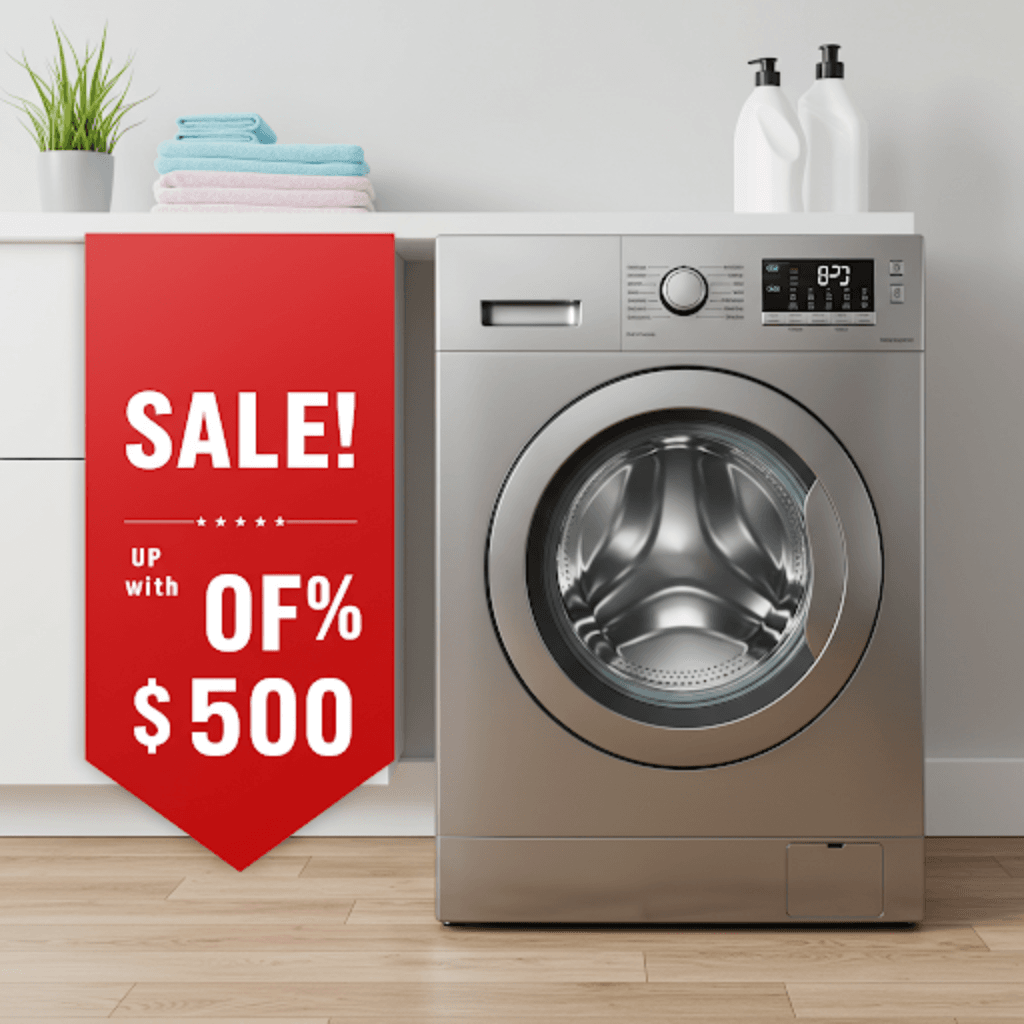
Washing machines on sale: Your ultimate guide to snagging a deal
The rhythmic hum of a washing machine is the soundtrack to a clean home. But when that hum turns into a clunk, or your energy bills start looking like mortgage payments, it might be time for an upgrade. And what better time to upgrade than when washing machines are on sale? This guide dives deep into the world of washing machine sales, helping you navigate the options, understand the features, and ultimately, find the perfect machine at the perfect price.
Why wait for a sale?
Washing machines are significant investments. Even a basic model can set you back several hundred dollars, while high-end machines with all the bells and whistles can easily reach into the thousands. Waiting for a sale can save you a substantial amount of money, sometimes hundreds of dollars, making that dream machine a little more attainable. Sales also often coincide with new model releases, meaning you might be able to snag a last year’s model – still packed with great features – at a heavily discounted price.
When are the best times to buy?
While sales can pop up throughout the year, there are certain times when you’re more likely to find significant discounts:
- Holiday Weekends: Think Memorial Day, Labor Day, Fourth of July, and especially Black Friday/Cyber Monday. These are peak sale times for major appliances. Retailers often offer deep discounts and special financing options.

- End of the Year: As retailers clear out inventory to make room for new models, you’ll often find great deals in the last few months of the year, particularly in December.
- New Model Releases: Manufacturers typically release new washing machine models in the spring and fall. This is a prime time to find discounts on the previous year’s models. Keep an eye on manufacturer websites and retailer announcements.
- Appliance Store Specific Sales: Many appliance retailers have their own sales events throughout the year. Sign up for email newsletters and follow them on social media to stay informed.
Types of washing machines: Finding the right fit
Before you start scouring for deals, it’s crucial to know what type of washing machine best suits your needs. Here’s a breakdown of the main types:
- Top-Load Washers: These are the traditional washing machines with a lid on top. They are generally less expensive than front-load washers and offer faster wash cycles.
- Agitator Top-Load: These have a central post (the agitator) that twists and turns to move clothes through the water. They are known for being tough on stains but can be harsher on clothes.
- Impeller Top-Load: These use a low-profile cone or disc (the impeller) to create currents in the water, gently moving clothes. They are generally gentler on clothes and use less water than agitator models.
- Front-Load Washers: These machines have a door on the front and tumble clothes to clean them. They are known for being energy-efficient, water-efficient, and gentler on clothes than top-load agitator models. They also typically have higher spin speeds, which means less drying time. However, they tend to be more expensive and have longer wash cycles.
- Washer-Dryer Combos: These all-in-one units combine a washer and dryer in a single machine. They are a great space-saving option for small apartments or homes, but they often have smaller capacities and longer cycle times than separate units.
- Compact Washers: Designed for smaller spaces, these washers are narrower and often shorter than standard models. They are perfect for apartments, condos, or RVs.
Key features to consider
Beyond the type of washer, there are numerous features to consider. Here are some of the most important:
- Capacity: This is measured in cubic feet and determines how much laundry you can wash at once. Consider your household size and laundry habits. A larger family will need a larger capacity machine.
- Energy Efficiency: Look for the Energy Star label. Energy Star certified washers use significantly less water and energy than standard models, saving you money on your utility bills.
- Water Usage: Front-load washers are generally more water-efficient than top-load washers. Consider this, especially if you live in an area with water restrictions or high water costs.
- Spin Speed: Measured in revolutions per minute (RPM), a higher spin speed removes more water from clothes, reducing drying time and energy consumption.
- Wash Cycles: Look for a variety of wash cycles to handle different types of fabrics and soil levels. Common cycles include normal, delicate, heavy-duty, bulky, and quick wash.
- Special Features: Modern washing machines come with a plethora of features, such as:
- Steam Cycles: Help to remove wrinkles and sanitize clothes.
- Smart Features: Wi-Fi connectivity allows you to control and monitor your washer remotely via a smartphone app.
- Automatic Dispenser: Automatically dispenses the correct amount of detergent, bleach, and fabric softener.
- Delay Start: Allows you to set the washer to start at a later time, taking advantage of off-peak electricity rates.
- Add Wash: Allows you to add forgotten items mid-cycle (typically found on front-load washers).
- Sanitize Cycle: Uses high temperatures to kill bacteria and allergens.
Decoding washing machine specifications
Understanding washing machine specifications can be like deciphering a foreign language. Here’s a quick guide to some common terms:
- IME (Integrated Modified Energy Factor): A measure of energy efficiency. Higher IME values indicate better energy efficiency.
- IWF (Integrated Water Factor): A measure of water efficiency. Lower IWF values indicate better water efficiency.
- DOE (Department of Energy): The U.S. Department of Energy sets energy efficiency standards for appliances.
Tips for snagging the best deal
Once you know what you’re looking for, here’s how to maximize your savings:
- Compare Prices: Don’t just settle for the first sale you see. Check prices at multiple retailers, both online and in-store.
- Read Reviews: See what other customers are saying about the models you’re considering. Pay attention to comments about reliability, performance, and ease of use.
- Look for Rebates: Manufacturers and retailers often offer rebates on washing machines. Check their websites for current offers.
- Consider Financing Options: Many retailers offer special financing options, such as 0% interest for a certain period. Be sure to read the fine print and understand the terms.
- Don’t Be Afraid to Negotiate: Especially at smaller appliance stores, you may be able to negotiate the price, particularly if you’re buying multiple appliances.
- Check for Price Matching: Some retailers offer price matching, meaning they’ll match a lower price found at a competitor.
- Factor in Delivery and Installation Costs: Some retailers offer free delivery and installation, while others charge extra. Be sure to factor these costs into the total price.
- Consider extended warrenties: Extended warrenties can offer safety if machine has malfunctions after standard warrenty.
The bottom line
Buying a washing machine on sale can be a great way to save money on a necessary appliance. By doing your research, understanding your needs, and knowing when and where to shop, you can find the perfect washing machine at a price that fits your budget. Remember to prioritize your needs and don’t get swayed solely by flashy features. A reliable, efficient machine that meets your laundry demands is ultimately the best investment.



